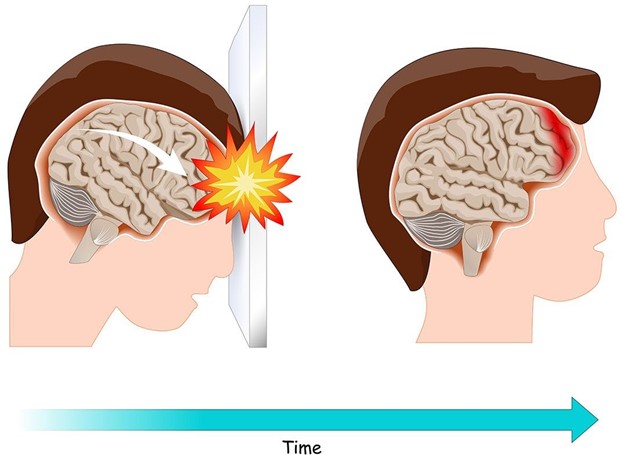What are some of the major causes of death related to spinal cord injury?
Sepsis
Pulmonary embolism
Pneumonia
All of the above
The Correct Answer is D
Choice A: Sepsis is a serious infection that occurs when the body's immune system overreacts to an injury or illness. It can cause organ failure and death. People with spinal cord injury are more prone to sepsis because they may have impaired bladder and bowel function, skin breakdown, or reduced sensation that can lead to infections.
Choice B: Pulmonary embolism is a blockage of an artery in the lungs by a blood clot. It can cause chest pain, shortness of breath, and death. People with spinal cord injury are more at risk of pulmonary embolism because they may have reduced mobility, blood circulation, or breathing capacity that can promote blood clot formation.
Choice C: Pneumonia is an inflammation of the lungs caused by bacteria, viruses, or fungi. It can cause fever, cough, and difficulty breathing. People with spinal cord injury are more susceptible to pneumonia because they may have weakened cough reflex, impaired lung function, or aspiration of food or saliva into the lungs.
Choice D: All of the above are major causes of death related to spinal cord injury. They can occur separately or together and can be prevented or treated with proper medical care and lifestyle modifications.
Nursing Test Bank
Naxlex Comprehensive Predictor Exams
Related Questions
Correct Answer is B
Explanation
Choice A: Injury from chemicals is incorrect because it is not a type of traumatic brain injury. Injury from chemicals is a type of toxic brain injury, which occurs when a substance such as alcohol, drugs, or carbon monoxide enters the bloodstream and affects the brain function or structure. It can cause symptoms such as confusion, memory loss, or seizures.
Choice B: Acceleration/deceleration injury occurs when the head accelerates and then rapidly decelerates, damaging brain tissue is correct because it is the definition of a closed traumatic brain injury. A closed traumatic brain injury occurs when the head moves violently without breaking the skull. This can cause the brain to hit against the inner wall of the skull or twist within the skull, resulting in bruising, tearing, or shearing of the brain tissue.
Choice C: Stressed injury to the brain is incorrect because it is not a type of traumatic brain injury. Stressed injury to the brain is a type of psychological brain injury, which occurs when a person experiences a traumatic event such as violence, abuse, or war. It can cause symptoms such as flashbacks, nightmares, or post-traumatic stress disorder.
Choice D: Object penetrates the brain or trauma is so severe that the scalp and skull are opened is incorrect because it is not a closed traumatic brain injury. It is a type of open traumatic brain injury, which occurs when a foreign object such as a bullet, knife, or bone fragment enters the brain or when a blunt force trauma such as a fall, collision, or assault causes a fracture or laceration of the skull. This can damage the brain tissue, blood vessels, and nerves and cause bleeding, swelling, or infection.

Correct Answer is A
Explanation
Choice A: Thickened liquids or pureed diet is correct because it can prevent aspiration, choking, or malnutrition in stroke patients. A stroke can impair the patient's ability to swallow, chew, or control their tongue and mouth movements. This can cause food or liquids to enter the airway instead of the esophagus, leading to pneumonia or death. A thickened liquid or pureed diet consists of foods that are smooth, soft, and easy to swallow. The nurse should assess the patient's swallowing function and provide appropriate food and drink consistency.
Choice B: Regular diet is incorrect because it can be unsafe or unsuitable for stroke patients. A regular diet consists of foods that are solid, crunchy, or sticky and require normal chewing and swallowing abilities. The nurse should not give a regular diet to a stroke patient unless they have passed a swallowing evaluation and have no signs of dysphagia.
Choice C: Renal diet is incorrect because it is not specific to stroke patients. A renal diet is designed for patients with kidney disease or failure. It limits the intake of sodium, potassium, phosphorus, and protein to reduce the workload and waste products of the kidneys. The nurse should not give a renal diet to a stroke patient unless they also have a kidney condition and a doctor's order.
Choice D: Cardiac diet is incorrect because it is not specific to stroke patients. A cardiac diet is designed for patients with heart disease or risk factors. It limits the intake of saturated fat, cholesterol, sodium, and sugar to lower the blood pressure and cholesterol levels and prevent further damage to the heart. The nurse should not give a cardiac diet to a stroke patient unless they also have a heart condition and a doctor's order.
Whether you are a student looking to ace your exams or a practicing nurse seeking to enhance your expertise , our nursing education contents will empower you with the confidence and competence to make a difference in the lives of patients and become a respected leader in the healthcare field.
Visit Naxlex, invest in your future and unlock endless possibilities with our unparalleled nursing education contents today
Report Wrong Answer on the Current Question
Do you disagree with the answer? If yes, what is your expected answer? Explain.
Kindly be descriptive with the issue you are facing.
